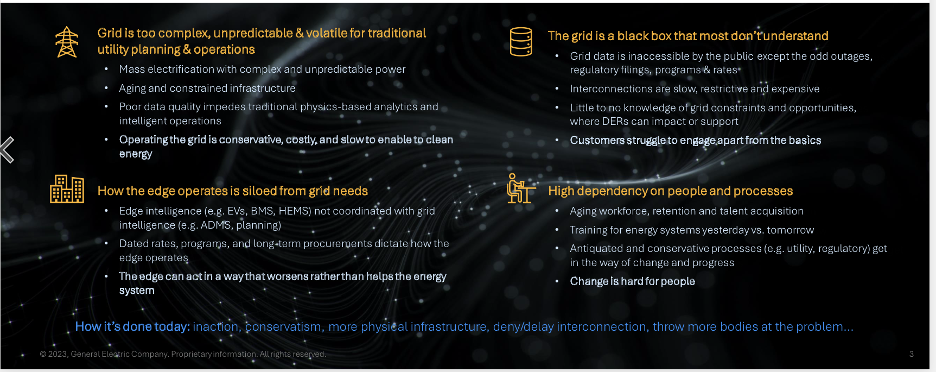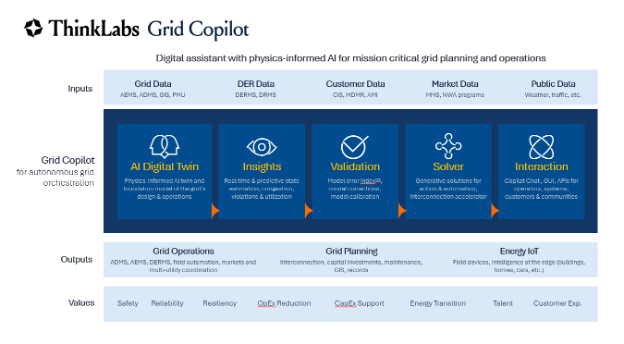Modernizing the Electrical Grid for a New Energy Era: Our Investment in Think Labs
Blackhorn Ventures is proud to announce our latest investment in ThinkLabs, which is accelerating the energy transition with an AI-powered co-pilot for grid operators. We’re proud to co-invest in their Series Seed alongside GE Vernova, PowerHouse Ventures, Active Impact Capital, Mercuria Energy, and Amplify Ventures. Blackhorn Partner Micah Kotch will join the company’s board of directors.
Our focus at Blackhorn Ventures is on founders who are transforming how we build, power, and move our world. As part of that focus, we’re thrilled to support ThinkLabs efforts to empower grid operators to leverage the power of AI to decarbonize the grid and make it more resilient.
Utilities around the world are struggling with a combination of growing loads, decarbonization commitments, a tidal wave of intermittent generation coming online, public pressure to limit rate increases, and workforce shortages. ThinkLabs solution has the potential to simplify grid operations, reduce outages, and shorten the interconnection queue for renewables and energy storage, which aligns with our mission, vision and values. We’re confident the support from our corporate strategic Limited Partners will help accelerate new deployments, and contribute to ThinkLabs emergence as a leader in the energy industry.
Grids Under Historic Pressures
Workforce Empowerment
The backbone of the energy transition is the electric grid, and arguably, the most critical individuals who operate our most critical infrastructure are grid operators. After more than a century of advancements, the grid is evolving to connect to a surge in data volume via a jump in renewable energy generation, data center growth driven by AI adoption, distributed energy resource expansion ( including via solar, EVs and energy storage), and new data inputs including smart meters. At the same time, utilities are staring down the ‘Silver Tsunami’; the average age in the utility industry is 50 and more than 50% of the utility workforce is set to retire over the next five years. New grid operators are in short-supply, and those that do exist are being asked to manage today’s grid with yesterday’s tools.
Shortening the Interconnection Queue
The shift from centralized to distributed generators requires accommodating unpredictable bi-directional electricity flows, while the integration of grid-connected devices, like EV charging stations and distributed solar and storage, add complexity. Delayed and inadequate investments in transmission and distribution infrastructure and grid upgrades have resulted in a total capacity of energy projects in U.S. interconnection queues that grew 40% year-over-year in 2022, with more than 1,350 GW of generation and 680 GW of storage waiting for approval to connect, according to a recent report from Lawrence Berkeley National Laboratory. Permitting reform, infrastructure investments, and software upgrades are required to move the needle: the typical energy project completed in 2022 spent five years in queue for interconnection approval compared to three years in 2015 and fewer than two years in 2008. Queue lengths are expected to grow as the Inflation Reduction Act spurs even greater interest in renewable energy among developers.
The Double-Edged Sword of Artificial Intelligence
Power systems are rapidly evolving due to increasing electricity demand and decarbonization efforts (Grid Strategies recently predicted an 81% jump in US load growth forecasts primarily due to demand from data centers, and the manufacturing boom). While artificial intelligence (AI) advancements are creating new power demands, they’re also part of the solution to meet this demand: AI models, doubling in computational power every five to six months since 2010, now excel in task automation. The energy sector recognizes this potential and is just beginning to use AI to boost efficiency amid the growth of smart grids and the surge in data generation. Across the global workforce, Artificial Intelligence and machine learning specialists are the profession experiencing the fastest growth in demand, creating a recruitment bottleneck. In June 2022, there were only 22 000 AI specialists globally across all industries, and 61% of large firms surveyed in the United Kingdom and United States reported lacking staff with sufficient AI experience. The energy industry will need to compete to recruit the best data scientists and programmers. ThinkLabs helps address this gap by productizing the data science and machine learning the industry needs.

A Solution Grid Operators Love
ThinkLabs is building AI native software for the energy industry; digital infrastructure that takes an AI-first perspective to improve electric grid performance. Their autonomous energy system (AES) will enable and accelerate the grid’s role as the electron and intelligence platform of the energy transition. Like autonomous driving for vehicles, autonomous energy systems provide successive levels of autonomy, from operator assistance, to ‘human in the loop’ copilots in the near term, and eventually full autonomy of grid and energy operations from the network to the edge.
At the heart of AES is an AI-augmented digital twin of the grid. This digital twin leverages the up-and-coming field of physics-informed AI, which overcomes data quality and computation constraints of traditional physics-only digital twins, as well as sparse data and “black box” effects of AI models. The result is transparent, trusted, robust, and high-performance operational analytics that are pre-trained and prepared for real-life conditions, while continuously learning and improving with field experience. ThinkLabs has a unique ability to yield actionable insights with imperfect data quality, rather than spending millions of dollars and countless hours to clean static data sets that will never be perfect enough for mathematical optimization (i.e. garbage-in-garbage-out). The deep diligence we’ve conducted with our network of grid operators and utility customers suggests ThinkLabs is building a solution that has real market pull.

Partnering with GE Vernova
The genesis of ThinkLabs comes from within GE Vernova; the new GE spinout on a mission to electrify the planet while simultaneously working to decarbonize it. GE’s significant utility relationships and access to grid data from utilities around the world provided fertile ground for the ThinkLabs team to design highly scalable grid power flow analytics in operational real-time, capable of managing fast-changing and flexible grid dynamics. The ThinkLabs platform has been trained with 50K+ scenarios and pretrained solutions to handle various generation, load, storage, and switching combinations, rather than relying on a handful of week/day ahead worst-case planning studies.
Initially, GE Vernova will serve as a primary channel for go-to-market, with GE Digital sales teams upselling the ThinkLabs solutions to existing GE Vernova utility customers (40% of global grid operators run GE systems). Given the challenge of the traditionally slow utility sales cycle, we see this as a massive competitive advantage, and a way to get to scale quickly. With average contract sizes that could range from $1-10M annually, ThinkLabs is partenring with Tier 1 Investor-Owned Utilities that have the ability to scale and grow over time (unlike some of their competitors, which are primarily focused on smaller electrical co-ops and municipally owned-utilities). The team already has 70+ utilities it has qualified and is pursuing channel relationships with cloud providers, consultants, and systems integrators who serve the utility sector, as GE Vernova does not have an exclusive on the ThinkLabs product.
Founders with domain expertise, exits, and experience scaling product
ThinkLabs CEO and Founder Josh Wong has spent his career in energy innovation. He was the former Head of Smart Grid at electric utility Toronto Hydro, and founded and exited Opus One (which built a enterprise-grade Distributed Energy Resource Management Solutions) to GE. Josh has over 15 years experience building hardware and software for smart grids and most recently led the Grid Orchestration team at GE. Neal Vali, Head of Engineering, has 15+ years of experience leading software engineering teams at Sirius XM Connected Vehicles and Omnitracs where he built products for heavily-regulated industries including Aerospace and Automotive. George Zheng has a grid data and power modeling background — he has also led technical teams, with over 13 years of experience modeling and analyzing power systems at GE Digital and PowerTech Labs. He also has experience applying generative AI to grid modeling. George previously led the design and development of advanced engineering analytics across the GE Vernova product platform. We believe deep subject-matter expertise around industry-specific data is the most important success factor for applying Generative AI to specific industries. Collectively, the team has excellent utility/grid data experience and strong industry networks: critical for getting to scale quickly. The team is currently hiring for ML software and data engineers – interested applicants should apply at thinklabs.ai